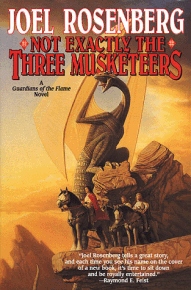

NOT EXACTLY THE THREE MUSKETEERSby Joel RosenbergTor0-312-85782-9316pp/$23.95/February 1999 |
 |
Reviewed by Steven H Silver
Not Exactly the Three Musketeers is the eighth novel in the "Guardian of the Flame" series and the first novel written for Tor Books. It differs from the previous books in that the protagonists are not the one-time role-players who were tricked into journeying to a fantasyland, but natives of that land, notable Durine, Kethol and Pirojil, a trio of soldiers whose claim to fame was that they accompanied Karl Cullinane on "The Old Emperor's Last Ride," a fact which they endlessly repeat throughout the novel.
Rosenberg's choice to focus on natives, relegating such characters as Walter Slovotsky and Doria Perlstein (the only original characters to make any sort of appearance) to support roles, unfortunately serves to undercut the originality which set the "Guardians of the Flame" series apart from other fantasy novels. At the same time, Rosenberg's reliance on locals gives the world a different flavor. The three men represent the old ways, remembering a time before Karl Cullinane set himself up as emperor of Holtun-Bieme. They are in a world which has been changed from the world which they knew, poised on the brink of a world they see will be better even as it forces them into obsolesence. Pirojil, Kethol and Durine don't seem to have a problem with that. They knew the "Old Emperor" and have faith in his vision for their world. . . even if he isn't around to carry it to fruition.
The plot is relatively straight forward. Dowager Empress Beralyn Furnael orders the men to travel to the barony of Keranahan to find out why Lady Leria, a young noblewoman, is being forced to marry against her will. This order forces the three soldiers into a power play between, apparently, Beralyn and Elanee, the baroness of Keranahan. Although the actual political motives are revealed to be more than the appear, they really aren't all that important. Just as the title would indicate, Not the Three Musketeers is a swashbuckling adventure.
Kethol, Pirojil and Durine are only loosely cast as Aramis, Athos and Porthos, eventually picking up their own "D'Artagnan" in the wizard Erenor. While Dumas's characters can be recognized in Rosenberg's characters, they are similarities, not identities. Pirojil has his own personality, distinct from Athos. Kethol is even less priestly than Aramis. Durine fails to hold to Porthos's fashion sense. These are, in facts, strengths of the novel. If the reader wants to read The Three Musketeers, Alexander Dumas's novel is sitting right there on the shelf. Not Exactly the Three Musketeers, is exactly what the title says. It is a tribute to Dumas's book, which can serve to interest new readers in The Three Musketeers or cause people familiar with the original book to want to pick it up an re-read it.
In fact, Not Exactly the Three Musketeers works better as a stand-alone tribute to Alexander Dumas than it does as a "Guardians of the Flame" novel. The previous seven books, aside from focusing on the same primary characters, focused on the same themes, building ideas of freedom and progress with each novel. Not Exactly the Three Musketeers halts the general progress of the series, almost as an aside (albeit an enjoyable aside) by following a trio of minor characters who haven't really appeared since the fourth novel.
As Rosenberg proved in The Heir Apparent, he is not particularly afraid to kill off characters. In that novel (which features "The Old Emperor's Last Ride"), Karl Cullinane, his primary character, is apparently killed in a massive explosion. With this knowledge, the reader can never be entirely sure that Rosenberg won't kill off his characters. By focussing on secondary characters in Not Exactly the Three Musketeers, Rosenberg makes it easier for himself to bring about the demise of a character at any moment, a feature which is lacking in much fantasy fiction.
While Not Exactly the Three Musketeers can be best enjoyed as the eighth book of a series, it stands on its own extremely well. The characters are well-drawn and enough of their past is hinted at that previous knowledge of the "Guardians of the Flame" is not required, although it would make the book even more enjoyable. With luck, the reader will not have to wait another four years before the next installment (which Rosenberg claims will be called Not Quite Scaramouche) is published.
